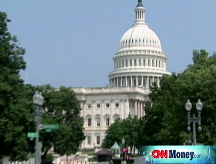4 insurers seek thrift status, gaining bailout access
On the last day possible to apply for bailout capital, four insurance companies apply to acquire thrifts and become savings-and-loan holding companies.
NEW YORK (CNNMoney.com) -- Four insurance companies applied Friday to become thrift holding companies and acquire savings and loans, which opens the door for them to seek bailout funds.
Friday was the deadline to apply for funding from the Treasury's Troubled Asset Relief Program.
Any bank, savings association, bank holding company or savings and loan holding company established and operating in the United States was eligible to apply for some amount of capital from the bailout plan. Insurers and foreign-controlled entities were not included.
The Hartford Financial Services Group, Lincoln National Corp., Genworth Financial Inc. and Aegon NV all submitted applications to become holding companies to the Office of Thrift Supervision (OTS) on Friday.
Hartford (HIG, Fortune 500) is seeking to acquire the Federal Trust Bank for about $10 billion, according to a company statement. Federal Trust Bank is a FDIC-insured savings bank owned by Federal Trust Corp. and based in Sanford, Fla.
Lincoln National (LNC, Fortune 500) applied to acquire Newton County Loan and Savings Bank and Genworth Financial Inc. (GNW, Fortune 500) applied to acquire the Inter Savings Bank, according to OTS spokesman William Ruberry. Aegon NV (AGN), a Dutch firm that owns U.S. insurer Transamerica, applied to acquire Suburban Federal Savings Bank, said Ruberry.
The Hartford said it would be eligible for anywhere between $1.1 billion and $3.4 billion in funds, under the current Treasury guidelines, although the company said the final amount would be determined by the government.
There was no information readily available about how much the other companies might seek from Treasury. Calls to Lincoln National and Aegon were not immediately returned.
Genworth declined to comment beyond confirming it filed with the OTS. However, the company had previously acknowledged on a conference call following its quarterly financial report earlier this month that TARP was one of the options it was considering as it looked to manage its capital and liquidity, said Genworth spokesman Al Orendrff.
"Securing capital at the terms available through the (Treasury's) Capital Purchase Program could be a prudent course in this market environment and would allow us to further supplement our existing capital resources," said Hartford Chief Executive Ramani Ayer in a statement.
Life insurance companies have taken a hit as the financial sector imploded in recent months. Insurance companies take consumer premiums and invest them in massive portfolios in order to make enough money to pay out life insurance claims.
Insurance companies have historically kept much of their investment portfolio in corporate bonds of banks and insurers. Therefore, insurance company portfolios are very highly exposed to the financial sector.
As the credit crisis caused banks to lose money, insurance companies have seen a significant chunk of their investment portfolios disappear.
At the end of October, Hartford Financial, MetLife (MET, Fortune 500) and Prudential Financial (PRU, Fortune 500) all reported a brutal third quarter as they took massive writedowns on investments in financial companies that lost significant value. There was talk that the government might extend bailout rescue efforts to the insurance sector but that has not yet materialized. ![]()


